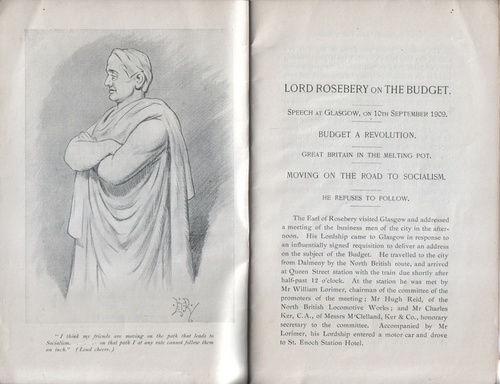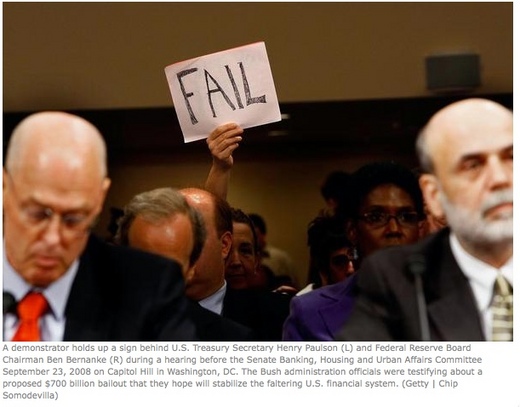I listened to Jim Murphy on the Politics Show today, a painful experience as usual, but one which set me thinking about the bank bailouts again. I still believe the Brown/Darling plan, which is simply to keep giving our money to banks and bankers until there's nothing left to give, will fail to meet its stated objective: to refloat the economic system which
Even if the give-away succeeds, in Labour's own terms, we'd be left with the same flawed system which has led to the current dismal economic, environmental and social circumstances. Surely a time like this should be an opportunity to take one more step back and ask what the banking system should be designed to deliver?
Such a question may be more complicated, for sure, but the outlines seem clear. Banks should provide a safe place for depositors to put their money, and that act should be rewarded. The first of those objectives has only been met over the last year because of
government intervention, and the latter is
hardly true now interest rates have nearly reached
Japanese-style rock bottom.
They should also lend to responsible businesses, enabling them to provide appropriate jobs, products and services, and to responsible individuals, helping them manage their lives better. Instead they used over-leveraged deposits to buy, repackage and resell speculative absurdities, and now they're
hardly lending to anyone despite the massive brown envelopes they've received on a regular basis since
September 2007.
Clearly, these simple objectives are not met by the existing system, despite the public props under it. Nor were they even properly met in the pre-crash supposedly happy days when only the prescient (yes, Nouriel Roubini
has a blog), the permanently pessimistic and the ideologically opposed foresaw any problems coming.
So what should we do instead? The clearest progressive alternative would instead see Government backing individuals, not the banks they've borrowed from, taking shares in people's houses to protect them from repossession and so on. The Treasury should be directly reducing the risks to sensible customers, not hoping the bailout will trickle down to borrowers and depositors.
The rest of the next multi-billion tranche of money destined for the bottomless pit in the city could then be diverted to capitalising a series of new regional banks, and perhaps other specialist financial institutions. Their constitutions could resemble those of the old trustee savings banks, the loss of which has been
bemoaned here before. Others could be set up as mutuals, credit unions, et cetera.
These new institutions could be established to put their communities' interests first, be required to lend with a due diligence eye on the long term, to focus on true sustainability, and they could be obliged to account for themselves transparently. Bonuses could be paid for genuine successes and responsible innovations, rather than automatically to the boards who oversee failure.
Before anyone suggests this is mere nationalisation fervour, it would also allow a proper application of market principles. Shares in these new banks could be given per-capita to local residents, a minority stake initially, then the rest could be issued on the same basis. Some of the old banks would be likely to fail, just as they are already, but their staff and their customers would have alternatives to turn to for work, for loans, and for savings accounts.
The primary losers would be the existing banks' shareholders, and there would be pain to get through, but at least it would ensure that that suffering was for a purpose. The bailout is hardly meeting their needs right now anyway, given that we appear to be trying to pour water into a series of sieves to fill them up.
We need
a financial system, true, but it doesn't have to be a replica of the irresponsible system praised by all the other parties in the good times. With this much capital being expended, we could instead lay the ground for a new set of players. Good banks, in short. Doesn't that sound better than taxpayers paying for a "
bad bank" and assuming the risk that properly belongs to shareholders?
In short, if the question is stupid, the answer will be too. Even if Brown/Darling/Murphy etc meet their own objectives, it's absolutely certain they will fail to usher in anything more responsible and imaginative. They have missed their chance to be remembered as the midwives to a new system designed to meet the needs of the country rather than the interests of the bankers. Failure is guaranteed.

Watching the egregious Mr Murphy also reminded me of a story from his first days in Westminster in 1997. On arrival he found the place a bit stuffy and rule-bound. After all, until 1998 anyone wishing to raise a point of order had to wear a
top hat to do so, and collapsible headgear was laid on just in case.
So Oor Jim took the initiative, and wrote to his 658 colleagues to suggest that he chair a committee to review procedures. Tam Dalyell, who'd been there for thirty-five years, was apparently heard to guffaw at his impertinence. Still, Murphy has learnt how to play the game now, and his properly refined New Labour talking points have replaced his youthful enthusiasm for change.

























